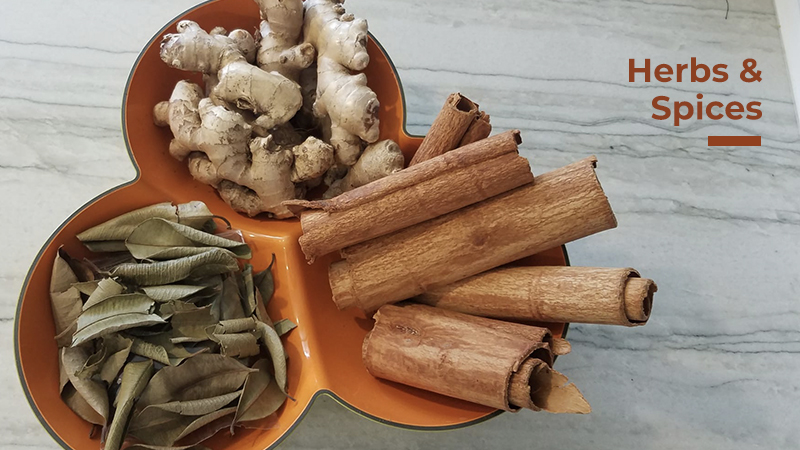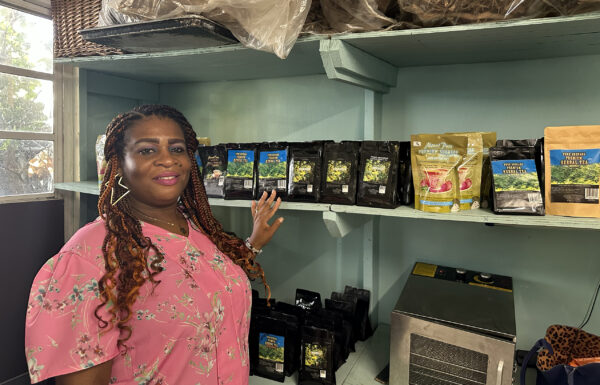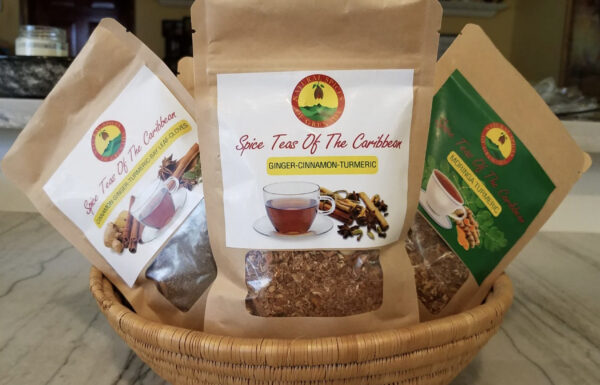Grenada — As the world marks National Herbs and Spices Day, Grenada, long known as the Isle of Spice, has every reason to celebrate. Rich in volcanic soil and natural biodiversity, Grenada and its sister isles continue to produce some of the highest graded, most sought-after herbs and spices in the world. But beyond the fragrant nutmeg and iconic cinnamon sticks, a growing community of Grenadian producers and exporters are stirring up global wellness markets — one herbal tea at a time.
Cultivating a Legacy: Laura’s Herbs and Spices
Nestled in the lush hills of Perdmontemps, St. David, Laura’s Herb and Spice Garden is a botanical treasure trove and one of the most impressive collections of plants in the Caribbean. Spanning seven acres, the garden first opened in 1995 and will mark its 30th anniversary later this year. Run as a co-operative and guided by tradition, it offers both locals and visitors the chance to learn about Grenada’s deeply rooted herbal culture.
The tour through Laura’s Herb and Spice Garden is guided with insight and warmth by its dedicated tour guides, in particular, Lorraine Francis, who has dedicated 25 years to the site. Her knowledge of each plant’s culinary and medicinal uses stands out, offering visitors a glimpse into the depth of traditional wisdom found throughout the garden. From bush teas to spice blends, the garden encapsulates centuries of herbal knowledge passed down through generations.
Bay leaf, lemongrass, turmeric and cinnamon — many still harvested by hand — are proudly displayed in their natural form. As guests make their way through the garden, the scent of spices drifts on the breeze from the abundance of herbs lining the paths. Wild basil, peppermint, rosemary and lavender are particularly striking. Among the more resilient sights are two cinnamon trees that were blown over during past hurricanes — Beryl in 2024 and Hurricane Ivan in 2004. Despite this, they continue to produce bark strong enough for harvest, a testament to the strength of the plants and the care invested in the garden.
A particularly memorable part of the experience is learning how cinnamon is harvested — a labour-intensive process where the bark is carefully stripped and sun-dried until it curls naturally. This fragrant spice is valued not just for its flavour in teas and desserts, but also for its use in traditional remedies for joint pain. It is known for its antioxidant and anti-inflammatory properties, and potential benefits for blood sugar control, brain health and cardiovascular support.
Visitors walk along paths layered with nutmeg shells, a reminder that nothing is wasted. Every part of the nutmeg — shell, seed and mace — is used, whether for food, oil or medicine. The shells crunch underfoot, releasing their scent into the air, while guides often hand out fresh herbs to smell, creating a sensory experience that lingers well after the tour ends. Delicate vanilla vines, which take nine months to mature and are hand-pollinated using a stick, offer another glimpse into the garden’s intricate processes. Guests also encounter unique plants like the Sleeping Beauty, which curls when touched, as well as black pepper vines, cocoa, ginger, moringa and clove — all grown and sold locally, helping to sustain the island’s economy and rich herbal heritage.
Beyond cultivation, the garden serves as a living classroom. Visitors learn not only how herbs grow, but also how they’ve been used across Grenadian homes — not just in cooking, but for healing. Bush teas made from soursop or moringa leaf, once passed down through oral tradition, are now being rediscovered as part of a growing global interest in natural wellness.
Small-Batch Excellence: Tea Production on Island
Tucked into the verdant surroundings of the Carenage, a small team at Mount Pure Natural Mineral Water is quietly championing the power of local herbs, one carefully dried leaf at a time. Widely recognised as an award-winning water company, Mount Pure began tea production at its facility in 2019, under the leadership of CEO and Founder Rolanda Mc Queen.
Branded under its flagship brand – Mount Pure – the company produces and packages premium tea blends, including its single blend Soursop tea – its first entry into the tea market. Today, despite its expansion into other organically produced teas, Soursop remains Mount Pure’s top seller – celebrated locally for its potential immune-boosting properties and its deep cultural roots in bush medicine.
According to Alicia Andrews, a longstanding employee of Mount Pure, what sets the operation apart, is the care with which the company handles each leaf. “We don’t dry in the sun,” Andrews said. “The sun takes the nutrients away. We dry them cool, in boxes, to keep everything natural and powerful.”
The leaves sourced from farmers in St David and St Patrick are hand-picked, washed, and gently dried without the use of any chemicals. It’s a true farm-to-cup process that honours both tradition and sustainability.
The tea menu has grown steadily to include favourites like lemongrass, cinnamon, ginger, and bay leaf, along with more unique blends such as breadfruit and Bois Bandé (pronounced bwah-bahn-day), a traditional remedy praised for its wide-ranging health benefits, from enhancing cognitive function and memory to helping prevent Alzheimer’s disease and brain damage while also helping to reduce cholesterol and alleviate stress and anxiety. Each variety is chosen with purpose, aimed at supporting health needs from high blood pressure to digestion. Sold locally and occasionally shipped abroad on order, these teas are beginning to find their way into international cups.
“We would love to expand globally,” Andrews added, “but even now, supporting local farmers and staying organic is what matters most. It’s healthier for everyone and it keeps our economy strong.”
From Grenadian Farms to U.S. Teacups
From Grenadian soil to American shelves, Elizabeth Allick, CEO and founder of Natural Spices of Grenada, is making waves. Based in Miami but deeply rooted in Grenada, Elizabeth works closely with farmers across the island – from St David to St Andrew, sourcing herbs for a line of hand-blended teas and spices.
“We blend a lot of the spices we have, like 14 different blends,” shared Allick. Natural Spices includes everything from turmeric-ginger teas for digestion to powerful detox blends using clove, bay leaf, and cinnamon. The teas are often infused with soursop, moringa, and lemongrass and are all created from spices farmed in Grenada for the company.
“We dry them there, we shred them there, and we ship them to Miami,” she said, adding that every product is small-batch and sun-dried to preserve the herbs’ full spectrum of health benefits.
According to Allick, what sets their business apart is their commitment to transparency and traceability. “We don’t buy from big box. You know what goes into your brew, and. And I take pride in doing that.”As for their customers, Allick indicates that they are international. “We sell to an educated consumer. People know what these herbs do. They come in asking for soursop, for moringa. They’re choosing wellness,” she said. ForAllick, it’s not about cures. “We promote a lifestyle. When your body is in balance, illnesses don’t form.”
Grenada’s herbs and spices are not just agricultural exports. They’re cultural emissaries. They tell the story of a people who understand that nature heals, who grow with care, and who believe in sharing their bounty with the world, one cup at a time.
This National Herbs and Spices Day, we raise our cups to Grenada, for its roots, its richness, and its role in global wellness.











